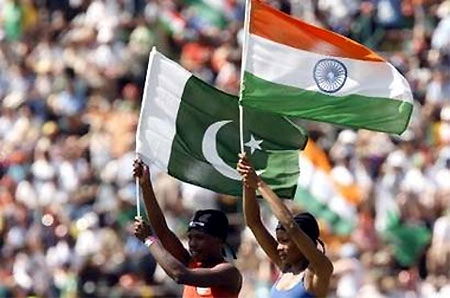
via Imago
India vs Pakistan

via Imago
India vs Pakistan
Probably only a few rivalries exist in the whole sporting world, which can outshine the Indo-Pak rivalry in terms of actual impact on issues much less trivial than a cup or a trophy.? It is one of the few rivalries which extend into multiple sports and is not restricted to merely one. However, as cricket is the biggest sport in both countries, for the time being, the focus will be cricket only. Fans love the tension, broadcasters and advertisers love the viewership numbers, the respective boards love the money that flows in as a result. Yet, the recent cross border ceasefire violations along with the perceptions that both countries indulge in state sponsored terror against the other (Pakistan sponsoring terror in Indian controlled Kashmir and India in Baluchistan) have been a sorts of salt on already festering wounds, the biggest one being Kashmir. The analysis of the allegations or the veracity of allegations is beyond the scope of this article.? The focus of this article is on the differing viewpoints that both sides have with regards to the series and perhaps how cricket can be more than just a sport.
The Indian Side?
With the Indian Cricket board by far the richest and the most powerful in the world, the need for an Indo-Pak series is not a pressing one for them. The recent government has taken a hard stance against the cross border violations and the general sentiment in the country has been extremely negative with respect to Pakistan on account of not only the violations but also the sheltering of anti-Indian elements such as Hafiz Saeed and Dawood Ibrahim, it is perhaps safe to say that most of the opposition to the series comes from the Indian side. From India?s point-of-view, the duplicitous nature of the Pakistani government, the continued support of the Hurriyat movement in Kashmir and the aforementioned ceasefire violations and state protection of anti-India elements makes playing cricket in such a situation, an extremely tough proposition. However, the recent visit of India?s Foreign Minister to Pakistan and the bonhomie between the Pakistan Prime Minister, Nawaz Sharif and the Indian Prime Minister Narendra Modi on the side-lines of Paris Climate Conference, may signal a thawing of the hard stance. Whether this translates to any positive action on the Indo-Pak cricket series remains to be seen.
ADVERTISEMENT
Article continues below this ad

via Getty
The 2003-04 Indo-Pak series was a landmark in Indo-Pak ties. It marked India’s first tour of Pakistan in 15 years. ? Getty Images
The Pakistan Side
ADVERTISEMENT
Article continues below this ad
For the cash strapped Pakistan cricket board, the series against India is a lifeline. The revenue generated from such a series will not only provide some much needed cash but also help bring some semblance of normalcy to Pakistani cricket which has been languishing since the terror attacks on the Sri Lankan cricket team. The terror attack on the Sri Lankan cricket team dealt a deadly blow to Pakistani cricket with almost all major cricketing nations refusing to tour Pakistan on account of security concerns. As domestic tours are generally more lucrative than foreign tours, this also had an impact on revenue of the cricket board. Paucity of funds meant that the salaries of the cricketers took a hit. And in 2008, the 26/11 attacks on Mumbai and the alleged role of Pakistan?s security agency, the ISI, led to the cancellation of all cricketing ties between the two nations. This included the cash rich Indian Premier League and this was appreciated neither by the PCB nor the players. From Pakistan?s point of view, political issues like the alleged role of ISI in Mumbai Attacks, the ceasefire violations, Kashmir, etc. have to be isolated from sporting ties. The most common viewpoint is that these issues cannot be solved in the near future but should not hold hostage the sporting relations between the two nations.? Further scandals like the spot fixing involving Salman Butt, Mohammad Asif and Mohammad Amer along with the paucity of funds has made the PCB desperate.
In a Nutshell
The nature of Indo-Pak relations are such that there will always be bumps on the roads as there are too many vested interests benefiting from the polarized relations between the two countries on both sides. Moreover, given the vast number of issues between the countries, it is na?ve to think that the two nations will see eye-to-eye on every issue. The leaders of both countries need to decide on some framework within which a dialogue between the nations can take place. This is, of course, easier said than done. However, the role that cricket can play to generate goodwill among the peoples of the two countries should be recognized and could even be the centrepiece of the framework. ?It should be noted that it is in the absence of such dialogue that espouses a general sense of apathy towards the other side.
ADVERTISEMENT
Article continues below this ad

via Imago
Cricket Diplomacy: The Mohali Semifinal of the 2011 World Cup saw the two respective primes ministers – Yousuf Gilani and Manmohan Singh – watching the match together. ?AFP
In the?recent months, the role of sports in diplomacy has become more prominent. ?The Fifa World Cup in 2014 and?2011 Cricket World Cup are just two recent examples that pop into mind. It provides a less politically charged atmosphere wherein important issues can be discussed by politicians and diplomats off-the-record and some sort of common ground can be found as the spotlight on the action on the field,. With relations at an all-time low, perhaps it?s the love of cricket common to both and inherited from their colonial past that can provide a much needed thaw in relations.
ADVERTISEMENT
ADVERTISEMENT
ADVERTISEMENT
ADVERTISEMENT

